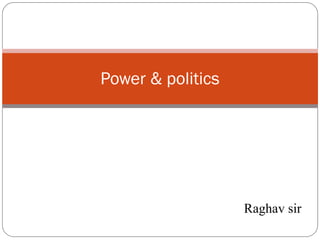Power & politics
The term power refers to the capacity or ability to influence the behavior of others to get the desire result (output). Bases of power(Sources of Power) Positional Power: Positional power also known as formal power, emerges from the position held by individual in an organization. Legitimate power: It is derived from the position a person hold in an organization, e.g. managing director, C.E.O, general manager etc. By holding that power one is able to influence the behavior of others. Reward power : It is based on influencer’s ability to Control the allocation of resources and rewards. Control the Salaries, wages, commissions etc. Coercive power: It is based on influencer’s ability to punish the employees for not carrying out orders. It also includes Power of application of physical sanctions. Restriction on movement, controlling satisfaction of basic need like, food, comfort etc, suspension, dismissal Information power: comes from the access to Information needed by others. The person who have sensitive information, can use this information to influence the behavior of others. Politics Those activities in the organization that are not required as part of one’s formal role in the organization, but, it attempts to influence the distribution of advantages & disadvantages within the organization. It is a way people gain and use power in an organization. Some political activities are: Withholding information from decision makers Spreading rumours Leaking confidential information Making alliances Whistle blowing

Recommended
Recommended
More Related Content
Similar to Power & politics
Similar to Power & politics (20)
More from Raghavjha37
More from Raghavjha37 (6)
Recently uploaded
Recently uploaded (20)
Power & politics
- 1. Raghav sir Power & politics
- 2. Power The term power refers to the capacity or ability to influence the behavior of others to get the desire result (output). According to Galbraith John K., “The term power may be defined as the capacity to influence others. If a person has power, it means that he is able to influence the behavior of other individuals.”
- 3. Bases of power(Sources of Power) Positional Power: Positional power also known as formal power, emerges from the position held by individual in an organization. Legitimate power: It is derived from the position a person hold in an organization, e.g. managing director, C.E.O, general manager etc. By holding that power one is able to influence the behavior of others. Reward power : It is based on influencer’s ability to Control the allocation of resources and rewards. Control the Salaries, wages, commissions etc. Coercive power: It is based on influencer’s ability to punish the employees for not carrying out orders. It also includes Power of application of physical sanctions. Restriction on movement, controlling satisfaction of basic need like, food, comfort etc, suspension, dismissal Information power: comes from the access to Information needed by others.The person who have sensitive information, can use this information to influence the behavior of others.
- 4. Bases of power(Sources of Power) Bases of Power Positional Power Legitimate Power Reward Power Coercive Power Information Power Personal Power Expert Power Referent Power Charismatic Power
- 5. Cont’d… Personal power(Certain unique qualities of a person attract followers.) Expert Power It is said that “Knowledge is Power” Influencer has some specific knowledge that others do not have. More knowledgeable person are not replaceable will have more power. Referent power It is based on identification. Identification is the process in which one person copies the behavior of other person. In this target get attracted and try to copy the person who may have some form of power. Charismatic power Charisma- a unique quality Popular in political, business and sports field.
- 6. Tactics to gain power Bargaining(more bargaining power-more benefits) Friendliness(make friends to get more power) Coalition(alliance of 2 or more people) Cooptation(giving important positions to people of other groups) Reason(analyse facts & data to take logical decision) Assertiveness (forcefully ask to follow direction) Higher authority(get support from higher authority) Sanctions(rewards & punishments) Pressure(put pressure to make others accept your terms)
- 7. Importance of power Necessary for coordinated activities Absence can create chaos. Chaos reduces the synergistic effects. Basis for authority and responsibility Help in executing them effectively.
- 8. Politics Those activities in the organization that are not required as part of one’s formal role in the organization, but, it attempts to influence the distribution of advantages & disadvantages within the organization. It is a way people gain and use power in an organization. Some political activities are: Withholding information from decision makers Spreading rumours Leaking confidential information Making alliances Whistle blowing
- 9. Features Involves use of power, authority and pressure(rewards & punishment) Self serving in nature(use of organizational resources for personal benefits) Not within formal job requirements Political decisions may not be rational
- 10. Functions To overcome employees inadequacies To cope with change in environment & technology To manage contacts in the large organizations To substitute for formal authority To appoint strong members of the organization into leadership roles. Helps in implementation of decision
- 11. Drawbacks Self interest Other employees may suffer(demotivation, wastage of time) Increases conflicts It may helps in growth but decreases performance & weakens relationships. Unequal distribution of power.
- 12. Causes of politics Competition to get more power Discretionary authority(eg: production dept. is given power appoint its staff without asking HR dept.) Ambiguity in organizations(confusion in terms of roles & authority) Subjective evaluation of performance. Saturation in promotion Joint decision making(gives rise to coalitions formed for self interests)
- 13. Management of organizational politics Clarity of roles, job, rules, procedures & authority Top management should discourage dysfunctional politics Direct actions to be taken by top management against people involved in dysfunctional politics Rewards should be given to deserving people, who fulfill their objectives. Similar, for punishments also.